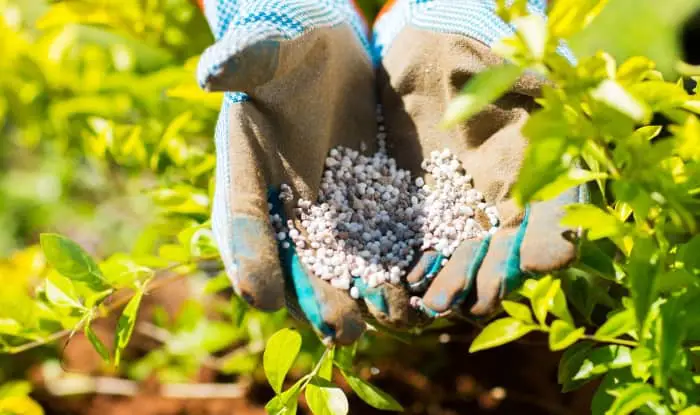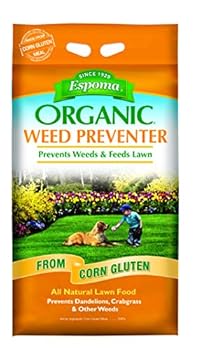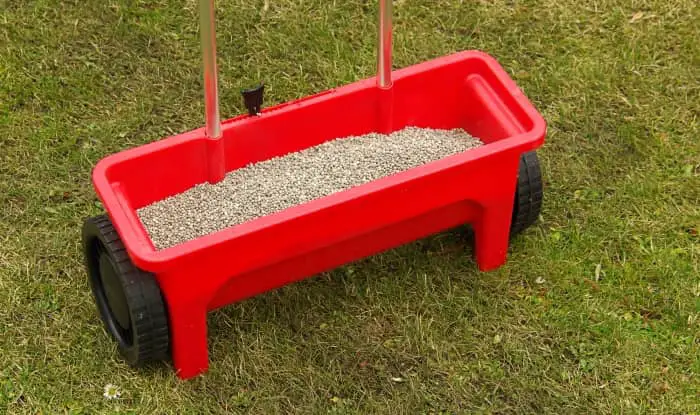Getting rid of weeds can be a difficult and time-consuming task if you do it by hand.
Whether it’s your lawn, flower beds, pasture, or gravel driveway you need to treat, it’s a lot easier when you use the best granular weed killer.
You can get 2 different types:
Pre-emergents stop weed seeds from germinating and prevent the plants from growing.
And post-emergents kill weeds that are already established.
Some granular weed killers combine both pre-emergent and post-emergent together—but they’re not always the best at either.
We’ve analyzed the top 30 products on the market. These are our recommended choices:
- The Andersons DG Pro Turf Barricade – Best Pre-emergent Weed Preventer
- Scotts Turf Builder Weed and Feed – Best Post-Emergent
- Preen Garden Weed Preventer – Best Budget Pre-emergent
- Espoma Organic Weed Preventer – Best Organic Pre-emergent
- Roundup Landscape Weed Preventer
- Spectracide Weed Stop For Lawns – Pre-Emergent & Post-Emergent
- Lilly Miller Noxall Vegetation Killer
All links lead to Amazon, where you can find more information & customer reviews.
The Best Granular Weed Killer Reviews
The Andersons DG Pro Turf Barricade Granular Weed Control
This product from The Andersons works as a highly-effective pre-emergent weed killer.
This means it prevents weed seeds from germinating in the soil so they can’t grow in your garden. But it won’t kill weeds that are already established and growing.
To get good results, you need to apply it at the right time of year. Usually in early spring just before germination time. And again in the fall.
It’s formulated to control most common grassy and broadleaf weeds. Including crabgrass, henbit, poa annua, goosegrass, dandelion, purslane, oxalis, chickweed, and carpetweed.
And it won’t harm your grass or desirable plants. So it’s ideal to use on your lawn, in your flower beds, and around landscape ornamentals.
The granules are easy to spread. And you should water them into the area after application.
Scotts Turf Builder Weed and Feed
One of the most well-known brands in lawn care, Scotts consistently delivers. This granular weed killer also includes a nitrogen fertilizer to help your lawn grow green and lush.
It’s safe to use on most types of grass, with the following recommended:
- Centipede
- Fescue
- Bermudagrass
- Ryegrass
- Bahiagrass
- Zoysia
- Kentucky bluegrass
It works as a post-emergent weed killer, killing most types of broadleaf weeds that grow on lawns. Such as clover, dandelion, plantain, and ground ivy.
Any drawbacks?
Well, you do have to be careful when applying it. If you overdo it, it can damage your grass. But the instructions are easy to follow.
And the fact it’s specially formulated for treating lawns is great if that’s where your weed problem is. But if you want to kill weeds elsewhere, or don’t care about fertilizing, then you might consider a different option.
Preen Garden Weed Preventer
Preen Garden Weed Preventer is another pre-emergent that’s designed to control weeds by stopping the seeds from germinating.
It kills all common species of weeds, but it’s safe to use around shrubs, trees, and flowers. However, it’s not recommended for use on grass. So it’s best to look for another product to protect your lawn.
Instead, Preen finds its best application in flower beds, vegetable gardens, and around shrubs and landscape gardens.
Once watered into the ground it forms a protective barrier for 3 months. And prevents broadleaf weeds such as knotweed, chickweed, thistle, and purslane. As well as grassy weeds like foxtail, crabgrass, and annual bluegrass.
Espoma Organic Weed Preventer
Espoma is a brand that’s well-known for its organic products. This one consists of weed and feed granules.
It’s a pre-emergent weed preventer, that’s made from corn gluten meal. Along with 8.23% slow-release nitrogen that fertilizes your lawn without any risk of burn.
It’s effective at preventing the growth of common weeds such as dandelions and crabgrass by preventing full germination.
But it won’t work on weeds that are already growing. In fact, if you add this product to an area of weeds you’ll just be encouraging more growth. So timing is essential with this product. With spring being the best time to apply the granules when soil temperatures first reach 65 °F.
Each time you apply it to the soil it prevents seed germination for about 6 weeks. So it gives you a good margin for error when estimating the right time to put it down, as long as you do it early enough.
Many people also like to use it in the fall at the end of the hot summer weather.
Roundup Landscape Weed Preventer
This granular pre-emergent weed killer can stop the growth of all broadleaf weeds and grasses in the treated area for up to 6 months. And it can do this without killing plants you want to keep.
So it’s a good choice for weed control in flower beds or around shrubs. But it’s not suitable for use on your grass.
Only use it around plants that have a fully grown root system. It uses a chemical ingredient called pendimethalin that stops the growth of plant roots and shoots. So any new seedlings nearby could be negatively affected.
Like most pre-emergents, it’s best used in early spring on ground that doesn’t have any weeds already growing on it. Use it before you put mulch on the ground.
Spectracide Weed Stop For Lawns Plus Crabgrass Preventer Granules
You can get 5 months of weed control with Spectracide Weed Stop granules. It kills over 200 different types of weeds including dandelion, clover, thistle, creeping charlie, and chickweed.
And it prevents unwanted annual grasses such as crabgrass from germinating and growing in your lawn.
It’s a pre-emergent and post-emergent herbicide. So you’ll need to apply it early spring to prevent the grasses from germinating. But you can continue to use it all the way through to the fall to kill any other weeds that appear.
It’s recommended to use this brand of lawn weed killer granules on the most common established turfgrasses. Including:
- Fescues
- Kentucky bluegrass
- Centipedegrass
- Zoysia grass
- Bermuda grass
- Perennial ryegrass
- Bahiagrass
- Buffalograss
- St. Augustine grass (except Floratam)
Results on growing weeds are visible within 24 hours. But you have to be careful not to use it near trees, shrubs, and flowers that you want to keep, as it may harm them as well.
Lilly Miller Noxall Vegetation Killer
This granular vegetation killer by Lilly Miller kills all plants you apply it to.
This means it’s not a good choice if you need to keep weeds off your lawn. And you have to be very careful using it around desirable plants.
But it is a good choice for using anywhere where you don’t want things to grow. Such as driveways, sidewalks, patios, pavers, and walkways, that have unwanted weeds growing through the cracks.
Just 1 application of the granules, watered in, is enough to keep plant life away for up to a year.
Choosing The Best Weed Killer Granules
Not all granulated weed killers are the same. They come with different methods of action. And different situations for which they’re suitable.
When choosing a product, there are a few things to be aware of.
Let’s take a closer look.
Pre-emergent vs Post-emergent Weed Killers
The best granular weed killers come in 2 different types, pre-emergent and post-emergent.
Pre-emergent weed killer granules are applied to the soil just before weed seeds start to germinate.
For weeds such as crabgrass, this is usually in early spring when the soil temperature starts to warm up.
And again in the fall. As many broadleaf weeds such as dandelions, henbit, and chickweed, germinate in the cool temperatures of September and October before growing rapidly in the spring.
When applied and watered into the soil at the right time, these granules will prevent germination and growth.
However, they will also stop any seeds you plant from sprouting.
And they don’t kill any weeds that are already growing. For that, you need a granular post-emergent weed killer.
Some products combine these 2 methods of action together to kill existing weeds and prevent any more from growing in the area.
But, it’s common for them to be more effective at one than the other. Or even, to do an average job of both. So it’s often better to buy products that specialize in being pre-emergent or post-emergent.
Is It Selective?
Weed killer that’s selective only targets certain types of plants.
For example, it’s quite common for selective weed killer to kill broadleaf weeds and certain grasses while leaving most of the common grasses people use on their lawn unharmed.
So the best granular weed killer for lawns will be one that’s selective.
Non-selective weed killers kill all plants you apply them to. This makes them a good choice for treating areas where you don’t want any vegetation growing such as gravel driveways, patios, sidewalks, paths, walkways, etc. But a bad choice for treating weeds in your lawn.
Organic or Chemical?
There are some good organic granular weed killers available on the market.
They are pre-emergent rather than post-emergent. And use corn gluten meal to prevent seed germination.
If you’re into organic gardening then these are the best weed killers for you.
But they’re not always the best option for everyone. Some customers find that chemical weed killers give more consistent results. And they also work out cheaper to use.
Granular Weed Killer vs Liquid Spray
There are some good reasons to choose granules instead of liquid weed killer.
One advantage is that it’s easy to get even application of the granular herbicide over the whole area you’re treating when you use a good spreader. Giving you more consistent results
When spraying a liquid using a tank or hose-end sprayer you have to be careful not to over-apply the weed killer to some areas while not applying enough to others.
Another benefit of granules and weed killer pellets is that you don’t have to worry about the liquid splashing onto your skin or clothing.
Conclusion
Whether you’re a professional with commercial work to do, or a homeowner trying to stop weeds growing in food plots and around paving blocks, a granular weed and grass killer can give you the control you’re looking for.
So, what is the best granular weed killer?
Our top rated choice is The Andersons DG Pro Turf Barricade. This professional-quality pre-emergent weed preventer is highly effective and good to use on a range of surfaces. Whether it’s lawns, flower beds, or gravel.
If you’re looking for a post-emergent that’s safe for your lawn, then one of the top granular weed killers is Scotts Turf Builder Weed and Feed. It’s highly effective at killing broadleaf weeds, and contains fertilizer to help your grass grow greener and stronger.
















